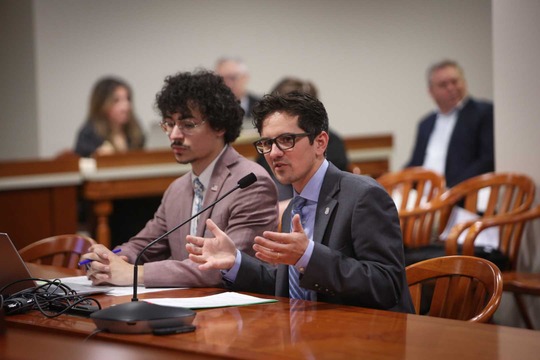LANSING, Mich., May 15, 2024 — In a significant stride toward ensuring fairness and equality in housing, House Bills 4062 and 4063, legislation aimed at ending housing income discrimination and addressing the housing crisis, passed out of the Judiciary Committee today. Sponsored by state Reps. Jennifer Conlin (D-Ann Arbor Charter Township) and Jason Morgan (D-Ann Arbor), these bills are set to improve the landscape of tenant rights in Michigan.

State Rep. Jason Morgan (D-Ann Arbor) speaks in support of his bill in the House Judiciary Committee on May 15 in Lansing.
House Bill 4062, introduced by Conlin, along with Senate Bills 205 and 206, seeks to prohibit landlords from discriminating against tenants or prospective tenants based on the source of their income. This includes denying tenancy, falsely representing availability or setting unfair terms in rental agreements. The proposed changes ensure that all individuals, regardless of where their income comes from, be it veterans benefits or child support payments, are treated with fairness and dignity in the housing market.
“We made a step toward eliminating systemic barriers in the housing industry,” Conlin said. “Housing is a basic human right, and no one should be unhoused in Michigan. These bills are about ensuring every Michigander has equitable access to housing.”
House Bill 4063, introduced by Morgan, along with Senate Bill 207, proposes amendments to the Elliott-Larsen Civil Rights Act to include income source as a protected category in real estate transactions. This enhancement prevents discrimination in renting or leasing of real property. It ensures that all individuals, regardless of their income source, receive equal housing opportunities and are not subject to biased treatment in any phase of real estate transactions.
“Housing is not a luxury — it’s a basic life necessity,” Morgan said. “Ensuring that the good families, veterans and seniors of Michigan are protected from discrimination based on their source of their income is fundamental to ensuring our hometowns are strong and inclusive.”
Both bills aim to enhance penalties for violations, including the possibility of recovering damages. As these bills move forward in the legislative process, they will establish a more equitable and just housing system in Michigan, reinforcing the state’s commitment to civil rights and equality for all its residents.

